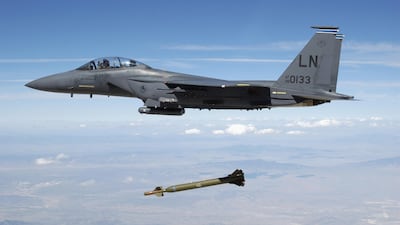Nine Russian helicopters were smoking wrecks alongside missile launchers, ammunition dumps and cratered runways in eastern Ukraine late on Tuesday evening.
For the first time, Ukraine had used its US-supplied ATACMS (Army Tactical Missile Systems) whose spread of cluster munitions and range of 165km allowed them to strike two airbases far behind Russian lines.
The missiles cost $1.4 million each but the harm they cause Moscow is significantly higher in terms of money, morale and key equipment loss.
That is why US President Joe Biden has made an urgent request for $100 billion in defence funding to assist not only Ukraine but also Israel, which is engaged in a war with Gaza, while taking into account the potential for a conflict in Taiwan.
The US defence budget was set at $773 billion for this fiscal year and the Pentagon asked for $842 billion for 2024 before Mr Biden's announcement.
The supplementals are why defence companies such as Lockheed Martin have seen their shares soar over the past week in a grim reminder that global conflict is spawning a requirement for more weapons used against America's foes.
“This [military] aid has a highly favourable risk-reward ratio,” said a recent Centre for Strategic and International Studies report.

“One of the United States’ most significant adversaries, Russia, is suffering extraordinary attrition. As many 120,000 Russian soldiers have died and perhaps three times that number have been wounded.”
Lockheed Martin announced quarterly results on Tuesday, saying its revenue had been boosted by war in Ukraine and restocking of arms such as shoulder-fired missiles, artillery and other weaponry. In a briefing an executive said they expected Congress to approve an "option for supplemental requests related to support Ukraine, Israel and potentially Taiwan".
The CSIS report urged America and its western allies to be prepared to support a long war with multiyear commitments.
Mr Biden understands that commitment but in the short run the $100 billion order will put America’s arms industry under considerable capacity strain, with the Ukraine war already drawing down stockpiles.
It is understood that Israel has requested an additional $10 billion, on top of the $3.8 billion it receives a year from America.

This is expected to include significant resupply of Tamir interceptor missiles for Israel’s Iron Dome air defence system, which is being used on a daily basis against Hamas missiles, as well as munitions such as JDam (joint direct attack munition) bombs.
While Ukraine has been supplied with some JDams, America has 500,000 in its stockpiles, making enough available for Israel.

However, America has a low number of its “bunker buster” bombs that could be used against Hamas underground systems but Israel has an estimated 100 of the 160 made to date.
There are an estimated 60,000 GMLRS precision missiles in stock, which are fired from the Himars system, although Ukraine is getting through large numbers.
There are only 1,000 ATACMS, but these are currently not required by Israel unless the war spreads. If that happens, Israel will require the missiles, drones and 155mm artillery rounds that are also crucial to Kyiv’s war effort.
However, Mr Biden has insisted the US is capable of meeting the demand, which will also require arming Taiwan to deter any potential attack from China.
“We’re the United States of America, for God’s sake, the most powerful nation in the history of the world,” he told CBS on Sunday. “We can take care of both of these and still maintain our overall international defence.”

While Washington has sent more than 20 military systems, including the Himars precision rockets, it will also need to provide long-term assistance to deter Russia such as mines, anti-tank weapons and air defence missiles, as well as tanks and artillery.
But in the short term Mr Biden’s aid package to assist Ukraine’s current offensive will need to ensure a steady supply of munitions and equipment including the ATACMS.
Mr Biden has also just approved money for the first-ever transfer of American arms to Taiwan using a programme normally aligned for sovereign states as the $80 million funding is part of Washington's foreign military financing.
The US government is also authorised to spend $2 billion a year in military assistance from 2023 to 2027 under the Taiwan Enhanced Resilience Act passed last year.


